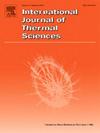ARX model identification for thermal virtual sensors in a vacuum heating furnace
IF 4.9
2区 工程技术
Q1 ENGINEERING, MECHANICAL
International Journal of Thermal Sciences
Pub Date : 2025-05-20
DOI:10.1016/j.ijthermalsci.2025.109971
引用次数: 0
Abstract
When heating a heterogeneous, aluminum load of several cubic meters in an industrial vacuum furnace, autoregressive with exogenous inputs (ARX) models can be used as virtual sensors to estimate the temperature at certain points on the load. The optimal orders of ARX models are selected via minimization of the corrected Akaike information criterion (), supplemented by the moderate contribution condition (MCC), which detects hidden model instability. The best ARX model inputs are a weighted average of heating powers via particle swarm optimization (PSO) to avoid input-power correlation, as well as the temperature at the center of the load to complete the boundary conditions. This paper reaches the identification of parsimonious and robust ARX models on industrial data for most cases, with a measurement-model deviation of less than 2% of the temperature variation to be calculated.
真空加热炉热虚拟传感器的ARX模型辨识
当在工业真空炉中加热几立方米的非均质铝负载时,带有外生输入的自回归(ARX)模型可以用作虚拟传感器来估计负载上某些点的温度。通过最小化修正后的赤池信息准则(Akaike information criterion, AICc)来选择ARX模型的最优阶数,并辅以适度贡献条件(moderate contribution condition, MCC)来检测模型的潜在不稳定性。ARX模型的最佳输入是通过粒子群优化(particle swarm optimization, PSO)对加热功率进行加权平均,以避免输入功率的相关性,并使用负荷中心温度来完成边界条件。本文在大多数情况下达到了对工业数据简洁和鲁棒的ARX模型的识别,测量模型偏差小于待计算温度变化的2%。
本文章由计算机程序翻译,如有差异,请以英文原文为准。
求助全文
约1分钟内获得全文
求助全文
来源期刊

International Journal of Thermal Sciences
工程技术-工程:机械
CiteScore
8.10
自引率
11.10%
发文量
531
审稿时长
55 days
期刊介绍:
The International Journal of Thermal Sciences is a journal devoted to the publication of fundamental studies on the physics of transfer processes in general, with an emphasis on thermal aspects and also applied research on various processes, energy systems and the environment. Articles are published in English and French, and are subject to peer review.
The fundamental subjects considered within the scope of the journal are:
* Heat and relevant mass transfer at all scales (nano, micro and macro) and in all types of material (heterogeneous, composites, biological,...) and fluid flow
* Forced, natural or mixed convection in reactive or non-reactive media
* Single or multi–phase fluid flow with or without phase change
* Near–and far–field radiative heat transfer
* Combined modes of heat transfer in complex systems (for example, plasmas, biological, geological,...)
* Multiscale modelling
The applied research topics include:
* Heat exchangers, heat pipes, cooling processes
* Transport phenomena taking place in industrial processes (chemical, food and agricultural, metallurgical, space and aeronautical, automobile industries)
* Nano–and micro–technology for energy, space, biosystems and devices
* Heat transport analysis in advanced systems
* Impact of energy–related processes on environment, and emerging energy systems
The study of thermophysical properties of materials and fluids, thermal measurement techniques, inverse methods, and the developments of experimental methods are within the scope of the International Journal of Thermal Sciences which also covers the modelling, and numerical methods applied to thermal transfer.
 求助内容:
求助内容: 应助结果提醒方式:
应助结果提醒方式:


